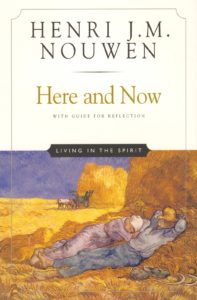Reading: Here and Now, Chapter I to Chapter IV (pages 15-83)
God became a little child in the midst of a violent world. Are we surprised
by joy or do we keep saying, “How nice and sweet, but the reality
is different.” What if the child reveals to us what is really real?
Here and Now, Surprised by Joy (p. 37)
It was so wonderful to see all your introductions last week. A spirit-filled, diverse, and committed global community is forming to read and discuss Henri Nouwen’s meditations on living a spiritual life. Henri has much to show us and we have much to share with each other as we journey through Advent together.
Today is the first day of Advent and Henri, like many other Christians, would have recognized it as the first day of the new church year. It is fitting that our Advent book discussion begins with Henri writing, “A new beginning! We must learn to live each day, each hour, yes each minute, as a new beginning to make everything new.” Henri is inviting us to use this Advent season to make a new beginning in our own spiritual lives. For Henri, and indeed for all Christians, our spiritual life begins with the truth of the Incarnation (see quote above). Henri writes, “My name is God-with-you.” (p. 17). The baby Jesus reveals to us what is really real.
With Henri as our faithful guide, in the coming weeks we will explore nine elements or themes of the spiritual life. We start this week by learning to live in the present, seeking joy, embracing suffering, and choosing conversion. These four chapters include 33 individual meditations that are rather easy to read (at least at first glance) yet are rich in meaning and worthy of thoughtful reflection. We look forward to learning how these chapters and meditations are meaningful in your life.
Here is a process that you might find helpful as you explore the readings.
- Concentrate on one chapter per day or between seven and nine brief meditations
- Read all of the meditations in the selected chapter in the order presented to gain insight into Henri’s approach to this element of the spiritual life.
- Select a few (perhaps 2 or 3) of the meditations that stand out to you, and read them thoroughly, perhaps several times and reflect on what they are saying. Consider:
- The thought or concept that stands out to you
- How does it relate to your personal experience? Look at your experience with the benefit of Henri’s insight. Does that help you to see things differently or to know yourself better?
- What is God speaking to your heart? Henri turned to scripture daily and that is reflected in many of these meditations. You might find it fruitful to seek out the Scriptural truths that Henri mentions or that God is speaking to your heart.
- How you will respond? Carefully (prayerfully) consider how your heart responds to the insights gained during your reflection. Are there small steps you can take to incorporate these insights and to apply this element to strengthen your spiritual life?
- Pray!
- You might also consider the questions in the Guide for Reflection (p. 203)
- Move on to another chapter.
Please share with the group the insights you have gained to the degree you are comfortable. This is an opportunity to share and discuss what came up for you in the readings. You may choose to share your reflections based on the questions above, but please don’t feel bound to them. Perhaps you’ll want to share from your own journey of discernment.
You are welcome and encouraged to comment as frequently as you like. If you would like to post your thoughts after each chapter, that would be wonderful. If you would prefer to post a comment weekly, that is also fine. You can also respond to the comments of others. And if you choose to follow along silently, you are welcome here too.
Once again, thank you for joining us for this Advent journey. We’re glad you’re here and we look forward to hearing from you.
Peace and all good.
Ray
P.S. Veterans of earlier discussions may wonder why Ray is flying solo this time, without long-time co-moderator Brynn Lawrence. Brynn gave birth to her second child, a beautiful baby girl, in October. Brynn, baby, and family are doing wonderfully. Brynn sends you all warm wishes for a blessed Advent.

